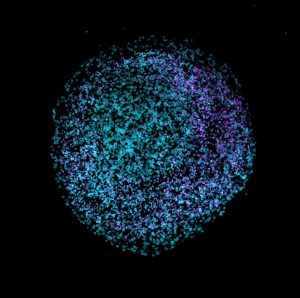
Image of a human brain organoid stained with DAPI (teal) and VIPR2 (magenta).
(Credit: Nreis1/Wikimedia)
Many bother about „artificial intelligence“. Should we bother more about brain models built on tissue from aborted foetuses? I suggest that we bother first of all about the enormous lag in ethical and social development of ourselves.
Humankind is still a long way from understanding how to evolve into a society of peaceful, compatible beings who live in respect for all living beings, including themselves—let alone from recognising this situation and trying to get out of it.
A prominent trait of H. sapiens is curiosity, which is why quadrillions of euros are spent on research worldwide every year and millions of scientists are employed. But the proportion of funds dedicated to the development of humanity itself is laughable at best, if there was anything to laugh at all.
Even where science focuses on H. sapiens, the abysmal discrepancy between our true behaviour and our realistic position in the cosmos is almost always disregarded.
What’s wrong with us?
Is it something in our brain? Is there something there that we had better fix? It is certainly interesting to know how the human brain has evolved and how it works, but I don’t think that the solution will be found here. There were societies—and there are still some last tiny relics—that were a little ahead in their human development, whereas they had less scientific knowledge about the brain.
Our modern society pursues the idea of finding the truth down to the smallest detail. Scientists build models to surprise the brain at work. With such an understanding of life, it is not surprising that a thing called „artificial intelligence“ evokes Homeric debates, as if this thing, a simple artefact of our nature, could ever become something alien or even a separate part of nature.
I would be more afraid of experiments with brain organoids that are built up in vitro from stem cells, recently also from tissue from aborted foetuses [1]. As this is considered an ethically sensitive use, the consent of the pregnant women and the competent authority has been obtained. But what about the fundamental ethical question of whether brain models based on living tissue should be created at all? For what purpose?
looking for the fly instead of the swarm of locusts
The aim of this study with foetal tissue was to create a brain cancer model. This could one day help to alleviate brain cancer in those affected and/or give them a longer life perspective. However, it will hardly help to prevent the occurrence of brain cancer, because so many exogenous triggers are involved: (i) the contamination of our environment with cocktails of all chemical compounds that are still permitted, (ii) the constant acceleration of our everyday lives and the associated stress and frustration, (iii) the increasing alienation of so many persons from the needs and behavioural patterns of our species, and so on.
And while such studies are probably intended to help those affected, the findings and techniques can be used through the back door for completely different interests, which I won’t go into here…
———
Source: Delilah Hendriks et al (2024): Human fetal brain self-organizes into long-term expanding organoids. Cell Press, open access
